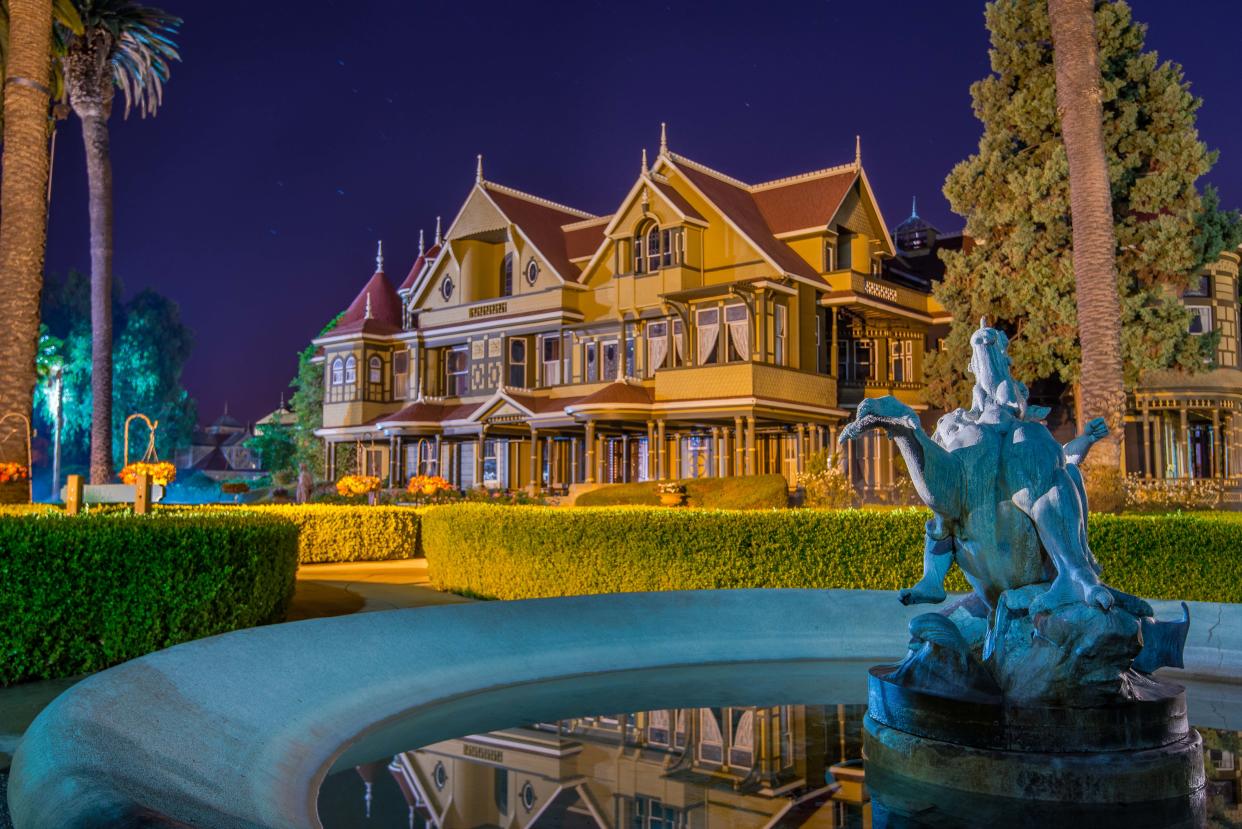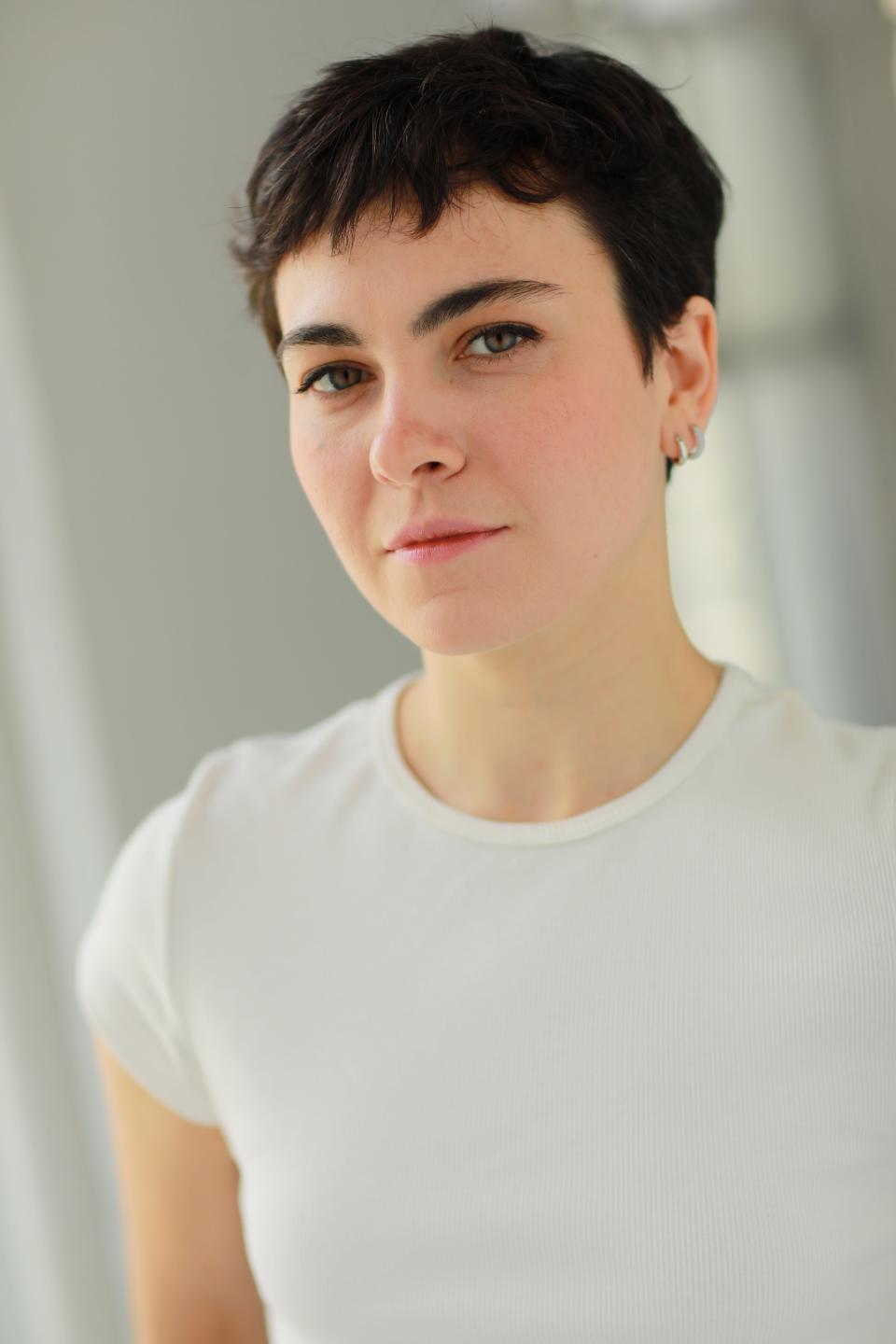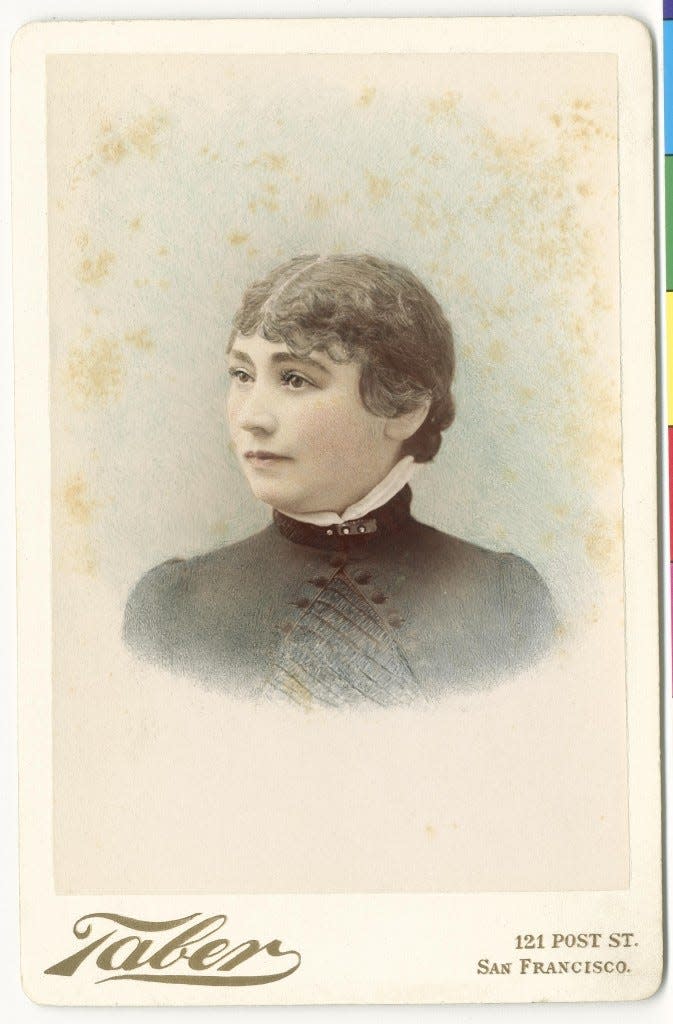GreenHouse Theatre Project's latest revolves around Winchester Mystery House builder

- Oops!Something went wrong.Please try again later.
Elizabeth Braaten Palmieri knows what it takes to build a house inside out, a house no one else expected.
As an actor, writer and director, she has led Columbia's site-specific GreenHouse Theatre Project to build houses of theater from galleries and wedding venues, on lakefronts and in living rooms. Palmieri and Co. consider each unswept corner, each right angle, every way the light might fall, treating space as a collaborator.
And so Palmieri carried both empathy and heightened curiosity into GreenHouse's latest production, "Winchester," which opens Thursday. Her original script revolves around the late Sarah Winchester, a bereaved heiress, a brilliant mind and a compulsive creator whose legacy is forever wrapped up in the iconic Winchester Mystery House.
The imposing mansion in San Jose, California is known for its scale and strangeness. The property's features include 10,000 windows, 2,000 doors, 52 skylights and 47 stairways and fireplaces, according to its website, some of which lead nowhere or somewhere altogether labyrinthine.
Palmieri wanted to understand what drove Sarah Winchester. And her play asks an important, too easily ignored question: When history gazes upon life and sees only a house, how can we come to know the woman inside — the one checking blueprints, staying up late, sleepless beside her ghosts?
Audiences can live alongside that question this week as GreenHouse builds "Winchester" in the second-story atrium of Missouri United Methodist Church.
More: What to know about Memorial Day fave Pedaler's Jamboree, a bicycle and music fest
The woman inside the Winchester Mystery House

Sarah Winchester's story exists where crushing trauma and boundless creativity meet. These are the types of stories Palmieri tells.
Past productions have inhabited the lives of women living complex, distinctly demanding lives. "Grounded" spent time with a pilot flying deadly, anonymous drone missions before returning home to cuddle her children; "Dark Creation" explored Mary Shelley's impetus to pen "Frankenstein" from a place of profound grief and a deep-seated need for rebirth.
The impulse to be all in, when the world fractures your attention, is compelling whether in or out of the theater.
"I think I’m just really drawn to these women who are not 'in their right minds' when something as big as an idea like the Mystery House or 'Frankenstein' hits them and they can’t turn away from it," Palmieri said.
Women especially build whole worlds from the materials of suffering.
"It all leads me back to how boring our world would be if people didn’t make things out of the crises that happen in their lives," Palmieri said, before adding an important qualifier. "There’s a lot of people who can’t — they shut down or break or combust."
Born Sarah Lockwood Pardee in 1839, this main character came into the world of the Winchesters at age 23, marrying William Wirt Winchester, the only son of the family behind the Winchester Repeating Arms Company. Sarah was a special, smart woman, Palmieri testified — speaking multiple languages, capable enough to be called a musical prodigy.

Winchester's life turned in response to interior and exterior curses. Her shoulders increasingly wore the burden of her family's fortune growing through the Civil War. The Winchester company's innovations kept Union soldiers stocked with the most capable killing machines history had known to date.
"She is the one holding the moral compass in the family. She is the one struggling with the fact that their fortune is lying in a pool of blood on these battlefields," Palmieri said.
That recognition alone might topple a person. But Winchester knew other, more intimate griefs. She and William struggled with infertility before conceiving a daughter, who died a month after her birth. Mental illness and the type of overwhelming emotions very intelligent people can experience also plagued her, Palmieri said.
When William died in 1881, Sarah's pain prompted a real turning point.
"We don’t know what happens to ourselves when we’re faced with turmoil and grief," Palmieri said.
More: Salt-N-Pepa, Robert Cray and Japanese Breakfast form half of Treeline fest's headliners
Upon consulting with a medium, Winchester received instructions to build a house. The dwelling would cover the sins of her family, and allow the spirits of those killed by Winchester rifles safe passage to the next life.
But Winchester must keep building, the medium said. To cease construction would bring about her death; continuing the work would yield immortality. That sort of power, over life and death, wasn't something Winchester wanted to wield for her own sake, Palmieri said.
"She was seeking atonement. She was seeking forgiveness ... she wanted to make things right before she left the world," she said.
The house that Sarah built
A desire for atonement turned into 38 years of constant building. Literally. Winchester lived inside the noise of hammering and sawing all day, every day, the din sounding out her fear and paranoia, Palmieri said. The house was keeping her alive, but the house was killing her.
And Winchester, in a way, became one with the spirits she sought.
"These ghosts, that she thought were trapped in the space as a punishment to her — she was desperately trying to release them. But she was the one who wanted to be released from it all," Palmieri said.
The house, Winchester's constant companion, becomes its own character in GreenHouse's play. Palmieri considered, then rejected more obvious nods to its features. Actors will move in front of a wall of windows that look out upon the older, more classically crafted of the church's buildings; the audience, then, will take in something impressive and beautiful — gorgeous lines, angles and rooftops, Palmieri said.
Perhaps the most faithful element of design will reveal itself as the cast works a small space within a much larger room; this is the very way Winchester lived, a few feet at a time against a vast backdrop.
Palmieri sees parallels between Winchester's labors and the creative process more broadly. The creator begins with momentum, investing time, energy and a great portion of themselves; eventually, the capital-letter questions arrive, sleep is lost, and expectations must be navigated, she said.
More: With new YA novel, Columbia native Nicole Schroeder harnesses her literary powers
At the end of every GreenHouse piece, Palmieri experiences gratitude for what she's learned about herself and the wider world. She wishes Winchester could have known that feeling, to have been supported into something like discovery and peace. This lack is the longest, truest tragedy of her life.
"She was as fearful at the end of her life as she was from that moment after she spoke with the medium," Palmieri said.
She knows something Winchester didn't — or just couldn't accept. That every curtain must close, every labor must cease. Perhaps within the world of the play, and then when it goes dark, Winchester and her story will know a degree of rest.
"Winchester" runs 8 p.m. Thursday through Sunday at Missouri United Methodist Church, 204 S. Ninth St. Thursday's show is sold out; tickets are $12-$18. Visit https://www.greenhousetp.org/ to learn more.
Aarik Danielsen is the features and culture editor for the Tribune. Contact him at adanielsen@columbiatribune.com or by calling 573-815-1731. Find him on Twitter @aarikdanielsen.
This article originally appeared on Columbia Daily Tribune: Strange, tragic life of Sarah Winchester drives new GreenHouse play

